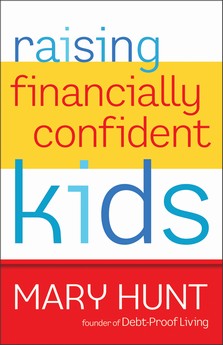Many parents today have no idea how to instruct their children in principles of money management. Raising Financially Confident Kids, by Mary Hunt, will give you a road-map to debt-proofing your kids and giving them tools for a lifetime of good money habits. Sadly, children in this day and age are often groomed to become part of the "It's all about me!" generation. Not that this is anything new. After all, there's nothing new under the sun. Ecclesiastes 5:10 states, "Whoever loves money never has money enough; whoever loves wealth is never satisfied with his income. This, too, is meaningless." In many U.S. households, children are being manipulated by advertising, peer pressure, and consumer-credit industries who tell them that they are entitled to whatever they want whenever they want it even if they don't really know how to pay for it. Some children will learn this lesson from their parents, too. Parents who constantly strive for a better house...newer car...classier furniture and decor...the latest trends in clothing and accessories...the most popular home remodeling projects...tech gear (smart phones, computers, you-name-it) as soon as it becomes available in the stores...expensive vacations. Is it wrong to have these items? No - although for those of us who are sometimes years behind the trends, it can get tempting to say, "Yes." :) Is it wrong to buy these items on credit? Or pay cash for them but be forced to pay for the basics of life on credit because the cash went to luxuries instead of necessities? Yes. Not only is this not biblical, but it is sending our children the wrong message that can impact them negatively for life. It’s easy for parents to get busy with cooking, cleaning, and carpooling – and forget to teach money management skills. Parents only have about 14-18 years to teach their children how to manage money skillfully. If a teen does not have a teachable spirit by the age of 14, then most of our ability as a parent to train and to guide our teens is finished. Failing to provide financial training sets young adults up for a lifetime of miserable debt. But there is hope and help for parents. Personal finance expert Mary Hunt prepares readers to debt-proof their kids in Raising Financially Confident Kids. Readers learn how to develop a unique debt-proofing plan designed specifically for their children that will tear down attitudes of entitlement, build financial intelligence, and neutralize the glamour of easy spending. Debt-proofed kids are guided by a set of values having to do with money, credit and debt. Hunt shares her own experiences raising two sons, who are now financially responsible adults, and gives hope to parents in every financial situation. Her family was $100,000 in debt before they saw their sons’ entitlement issues and realized the importance of teaching their 8- and 7-year-old the basics of money management. There is good news for parents in financial crisis; they will learn alongside their kids and grow together as a family as they begin to educate themselves and change their outlook on money. In Raising Financially Confident Kids, Hunt takes on the nuts and bolts of debt-proofing your kids and gives practical advice for parents. Hunt systematically lays out her proven method, which is tailored for preschoolers through high school and designed to help parents:
According to Hunt, “It takes relatively little effort to teach kids about money, and the payoff is enormous. If you are diligent to work this teaching into the normal course of family life, it will come as naturally as teaching kids good manners or how to do laundry. It will be as ordinary as teaching them how to mow the lawn or wash the car.” Julieanne's thoughts: Raising Financially Confident Kids is an easy, quick read, which is great for busy parents. I enjoyed reading Hunt's Basic Money Values, which can easily be written out by children or parents and used as their family's financial philosophy (see page 72-74). Hunt's list of how to help your children determine the difference between needs and wants is excellent. (pgs. 140-141). She also provides clear and short steps on how to teach your children about saving, banking, ATMs, keeping a spending plan, making a spending record, credit cards, credit scores, and much more! My only negative comment about this book is that although it was updated and reprinted in 2012, it still contains some information that has been outdated for quite some time. There are a couple of sections that teach about compound interest. In the examples that are given, Hunt uses comparisons of 10% interest on a savings account, and also 6% interest rates. I think she should have mentioned that at some time in the future, being able to receive 6% interest on a savings account may be possible, but at the time of this writing, it is not. I personally find it very discouraging to save money in the bank, knowing it is actually losing money when I add in the inflation index each year. Receiving 0.03% interest, or whatever I currently receive on my savings account, provides no incentive whatsoever for me to set aside money to accrue interest. Yes, our family does save money in the bank each month, but it gains virtually no interest year after year, and so our girls, while also saving money, are not encouraged by all this "wonderful compounding interest" that all of the financial books discuss. I don't blame them. It doesn't excite me at all, either. I do feel like this book should have been updated to explain the problem with the lack of compound interest these days, especially since this has gone on for years and years now. However, with that said, I think this is a very valuable book - more like a financial teaching guide - to use with your children. You might even find that this book will help you straighten out some of your own financial problems when you read the benefits of living a debt-free lifestyle. We've taken our children through a popular 12-week money management seminar that was held at our church, and after our house is paid off, our goal is to remain debt free. Raising Financially Confident Kids just adds tools to our financial toolbox so we can continue to guide our children to living debt-free lives for themselves. Raising Financially Confident Kids is available August 2012 at your favorite bookseller - from Revell, a division of Baker Publishing Group. I received one paperback copy of Raising Financially confident Kids in exchange for my honest review of this book. No other compensation was provided.
0 Comments
Leave a Reply. |
Hi! I'm Julieanne!
|








